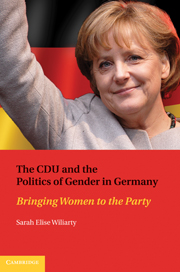Book contents
- Frontmatter
- Contents
- List of Figure and Tables
- Acknowledgments
- The CDU and the Politics of Gender in Germany
- Introduction: A Democratic Paradox?
- 1 The Puzzle of CDU Policy Making on Women's Issues
- 2 The Corporatist Catch-All Party Model
- 3 The Postwar CDU: Origins of a Corporatist Catch-All Party
- 4 The Emergence of the Women's Union, 1969–1982
- 5 The Women's Union in the Dominant Coalition, 1982–1989
- 6 Looking Eastward: The Women's Union and Cobbled Coalitions, 1989–1998
- 7 The Rise of Angela Merkel: Policy and Personnel Decisions of the CDU in Unified Germany
- 8 Christian Democracy With and Without Corporatism: Policy Making on Women's Issues in Austria, Italy, and the Netherlands
- 9 Conclusion
- Appendix: List of Cited Interviews
- List of References
- Index
9 - Conclusion
Published online by Cambridge University Press: 17 November 2010
- Frontmatter
- Contents
- List of Figure and Tables
- Acknowledgments
- The CDU and the Politics of Gender in Germany
- Introduction: A Democratic Paradox?
- 1 The Puzzle of CDU Policy Making on Women's Issues
- 2 The Corporatist Catch-All Party Model
- 3 The Postwar CDU: Origins of a Corporatist Catch-All Party
- 4 The Emergence of the Women's Union, 1969–1982
- 5 The Women's Union in the Dominant Coalition, 1982–1989
- 6 Looking Eastward: The Women's Union and Cobbled Coalitions, 1989–1998
- 7 The Rise of Angela Merkel: Policy and Personnel Decisions of the CDU in Unified Germany
- 8 Christian Democracy With and Without Corporatism: Policy Making on Women's Issues in Austria, Italy, and the Netherlands
- 9 Conclusion
- Appendix: List of Cited Interviews
- List of References
- Index
Summary
In September 1998, the Christian Democratic–Liberal coalition that had governed Germany for sixteen years was defeated in national elections. While the CDU itself was reluctant to acknowledge the problem, a primary reason behind this defeat was that the Christian Democrats lost the support of female voters, especially older women who had formed the party's most loyal support group (Molitor and Neu 1999). Certainly, many other factors contributed to the removal of the Christian Democrats from office: weariness with Helmut Kohl, a stalled economy with high unemployment, and the desire for something new. But if the CDU had managed to maintain its earlier levels of female support, Kohl and the Christian Democrats might have pulled out yet another victory.
In the 1998 Bundestag elections, the CDU/CSU's advantage with female voters effectively vanished. The Christian Democrats received only 0.1 percent more votes from women than from men. This was the smallest women's bonus ever, with the exception of 1980. The 1998 elections also marked the first time in the history of the Federal Republic that the majority of women ages 45 to 59 voted for parties of the left, rather than parties of the right (Molitor and Neu 1999: 257). However, the situation was even worse in 2002 when the CDU again polled worse with women than with men. When the party recovered some of this ground among women in 2005, it was able to reenter government.
- Type
- Chapter
- Information
- The CDU and the Politics of Gender in GermanyBringing Women to the Party, pp. 218 - 237Publisher: Cambridge University PressPrint publication year: 2010



